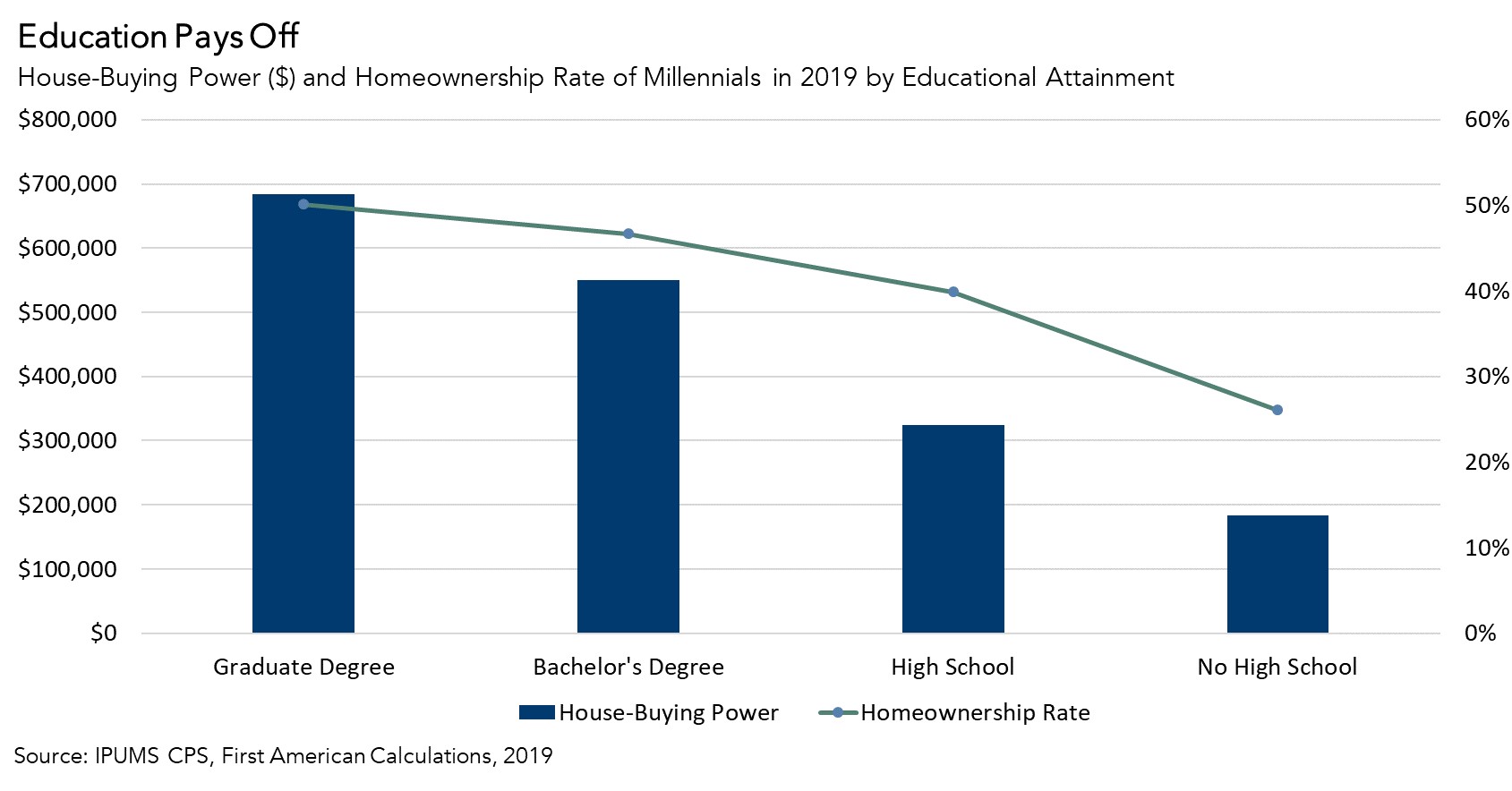Examining critical lifestyle, societal and economic trends can provide a strong indication of the likelihood of owning a home and, in turn, potential homeownership demand. This is the fundamental concept behind our annual Homeownership Progress Index (HPRI). Understanding these forces and tracking how they change over time allows us to measure potential homeownership demand. According to our recent release of the 2019 Homeownership Progress Index (HPRI), potential homeownership demand grew nearly one percentage point nationally in 2019.
"While homeownership for millennials has been delayed as they further their educations, it has not been denied."
When broken down by age group, we find that the majority of the potential demand for homeownership in 2019 and 2018 was driven by the millennial generation, those between the ages of 22 and 38 (in 2019). Even though they drove the bulk of potential homeownership demand in 2019, millennials and their lifestyle choices may explain why millennial homeownership still lags behind their predecessors. Millennials are choosing to delay critical lifestyle choices that are often triggers to buying a home, primarily getting married and having kids, because largest numbers of millennials are focused on furthering their educations. The rise in millennial educational attainment, while it may delay homeownership demand compared with their predecessors in the near-term, increases the likelihood of even greater homeownership demand for this generation.
Baby Boomers and Generation X, Millennials are Smarter than You
By at least one measure, millennials are smarter than their generational predecessors, Baby Boomers and Generation X. Millennials are the most educated generational cohort in U.S. history. Comparing each generation’s educational attainment at the same age of 38, 45 percent of millennials have a bachelor’s degree or higher, while only 38 percent of Generation X and 24 percent of Baby Boomers did. The share of millennials with bachelor’s degrees or higher will likely continue to rise, as some younger millennials have yet to graduate. Education takes time and money, which helps explain why millennials are delaying important lifestyle decisions, such as marriage, having children or owning a home.
As educational attainment levels increase, homeownership rates are more likely to grow, as well. In fact, the importance of education to homeownership has only increased over time. In 2000, the difference in the homeownership rate between those with a high school degree or less and those with at least a college degree was approximately 9 percent. By 2019, this gap had widened to 11 percent.
Is All That Education Paying Off?
When breaking down house-buying power by educational attainment for millennials in 2019, we find that the higher the education, the higher the household income, and the higher the house-buying power. In 2019, median house-buying power for millennials increased 16 percent relative to 2018. The reason? Median household income increased by nearly 8 percent, while mortgage rates fell by 0.6 percentage points in 2019.
Consider the significant advantage in house-buying power driven by educational attainment. For example, the difference in house-buying power between a millennial with a high school degree (or some college/associate degree) and a millennial with a bachelor’s degree is approximately $225,000. This helps explain why the homeownership rate in 2019 among millennials with a bachelor’s degree was 6.8 percentage points higher than the homeownership among millennials with a high school degree. It’s clear then, that higher levels of educational attainment are paying off for this generation.

Homeownership Delayed, Not Denied
While the homeownership rate for millennials currently lags preceding generations, we know that income is a strong predictor of the likelihood of becoming a homeowner, and we know that millennials are just as interested in becoming homeowners as their predecessors. In fact, the oldest millennials at age 38 are out-earning Generation X at the same age by nearly $7,000 a year, according to median household income.
Just as we saw millennials drive the homeownership rate higher in 2019, we can expect the same in the years to come. As higher educational attainment among millennials results in higher household income, their higher income, coupled with historically low mortgage rates, boosts millennial house-buying power. Our research finds that even if household income growth remains flat year over year in 2020 due to the economic impacts from COVID-19, historically low mortgage rates will keep house-buying power high.
In our next post, we will examine how aging into key lifestyle decisions, such as getting married and having children, will accelerate growth in the homeownership rate. The takeaway is that, while homeownership for millennials has been delayed as they further their educations, it has not been denied.



